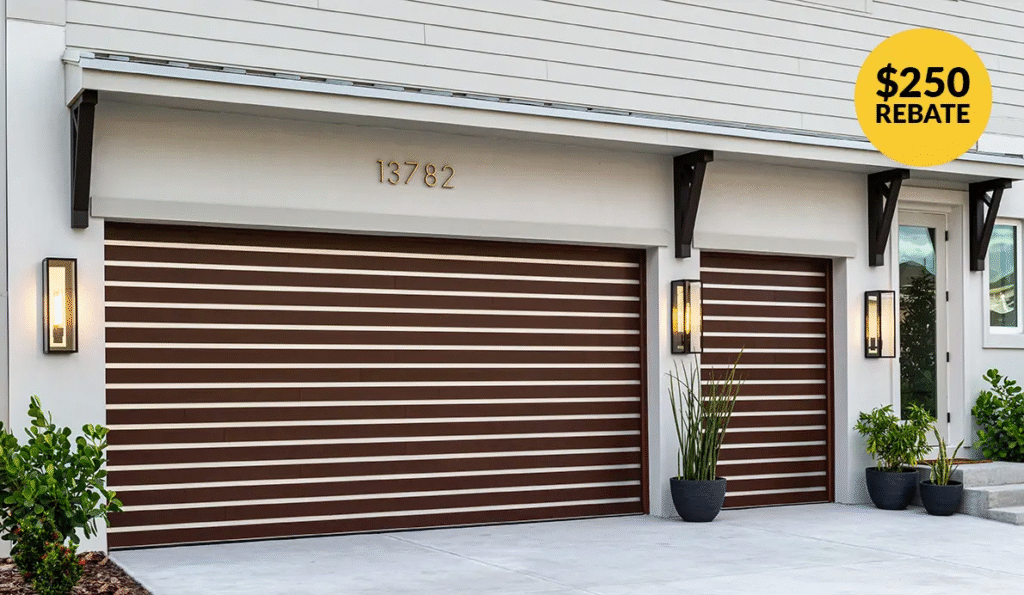A garage door can last decades or just a few years – the difference lies in how well you maintain it. Most homeowners want their garage doors to last longer, but they only pay attention when problems arise. The telltale signs usually appear through strange noises or complete system failures.
Your garage door needs consistent care to avoid unexpected breakdowns. Basic maintenance tasks involve hardware inspections, moving part lubrication, and seasonal upkeep. Modern homes with sophisticated opening systems need extra attention to keep everything running smoothly. The system requires special care especially when you have automated features.
Table Of Contents
- Inspect and Test Your Garage Door Regularly
- Lubricate and Clean Moving Parts
- Seasonal Garage Door Maintenance Tips
- Conclusion
- FAQs
Your fall maintenance routine becomes crucial before winter sets in to prevent freezing and cold-weather problems. A well-maintained garage door protects your home and keeps it functional. This piece will show you practical steps for each season that will help your garage door work reliably throughout the year.
Inspect and Test Your Garage Door Regularly
Regular checks are the life-blood of garage door maintenance that works. Your garage door system needs inspection, but how often? A full picture every three months works best, along with quick visual checks monthly.
Your hardware components need attention first. The springs, cables, rollers, and pulleys might show wear or damage. These parts work under massive tension and could cause serious injury if they fail. The vibration from daily use can loosen bolts and screws, so check if they need tightening.
The door’s balance needs testing too. Pull the release handle (the red cord) to disconnect the opener. Now lift the door halfway manually. A well-balanced door stays put without help. The springs probably need adjustment if the door drops or shoots up – Grand Valley Garage Doors can handle this job safely.
Safety features need regular testing. The auto-reverse mechanism keeps everyone safe. Put a roll of paper towels under the door and close it. The door should reverse direction right away when it touches the roll. The photoelectric sensors’ (the eyes near the floor) arrangement and function need checking too.
Strange sounds need your attention. The door might need quick repairs if you hear grinding, scraping, or popping noises.
Lubricate and Clean Moving Parts
Your garage door’s secret weapon is proper lubrication. A thorough inspection followed by the right lubricants on moving parts will prevent friction. This reduces noise and makes your door system last longer.
You need to know which parts need lubrication. Metal components that rub against each other are your main focus. Your door’s hinges, rollers, tracks, springs, and chain or screw drive (for automatic openers) all need attention. Many people think any lubricant works well for garage doors. This isn’t true. Avoid using WD-40 on tracks and rollers because it acts as a solvent rather than a lubricant. The best choice is silicone-based or lithium-based garage door lubricants made specifically for this job.
Clean the tracks and components before you add new lubricant. Take a clean cloth and wipe away dirt, debris, and old lubricant. The new lubricant will stick better and work longer this way.
Your garage door needs lubrication every six months to work its best. Don’t wait for scheduled maintenance if you hear squeaking or grinding – add lubricant right away. Doors near the coast need more frequent care because of salt air exposure.
We have seen proper lubrication save homeowners from repair calls. A few minutes of simple maintenance today will help you avoid repairs that can get pricey tomorrow.
Seasonal Garage Door Maintenance Tips
Your garage door needs different types of maintenance as seasons change. Each season creates its own set of challenges that could affect how well your door works.
Spring is the time to clean up after winter’s harsh conditions. The tracks need cleaning to remove salt residue and debris. A good wash of the door’s exterior helps prevent corrosion. The weather stripping might have cracked during winter freezes, so this is a great time to check it.
Summer heat and humidity can cause wooden doors to warp and metal parts to expand. Wooden doors need a fresh coat of water-resistant paint or sealant to protect against moisture damage. The garage needs good ventilation to keep humidity levels down.
Fall is the time to get your garage door ready for cold weather. The opener’s battery backup system needs testing because power outages happen more often in winter. The bottom seal should make complete contact with the ground to keep leaves and snow out.
Winter brings the challenge of preventing freeze-ups. Snow should be cleared from the door area and tracks regularly. Salt near the door can damage metal components, so it’s best to avoid it. We at Grand Valley Garage Doors suggest using a cold-weather lubricant that stays fluid in freezing temperatures.
Regular repair and maintenance that matches each season will make your door last by a lot and help you avoid seasonal emergencies.
Conclusion
Regular garage door maintenance definitely pays off year-round. A combination of routine checks and proper lubrication builds a foundation for smooth operation that keeps your property and family safe. Most homeowners don’t think about these basic tasks until something goes wrong, though prevention costs nowhere near as much as emergency fixes.
Each season brings unique challenges to garage door systems. Your maintenance routine needs adjustments to tackle specific seasonal issues before they become major problems. The door’s lifespan depends on vital tasks like spring cleaning, summer heat protection, fall preparation, and winter weatherproofing.
Basic garage door upkeep doesn’t demand extensive technical expertise. Most homeowners can handle simple tasks like checking for strange noises, inspecting hardware connections, and applying the right lubricants. Notwithstanding that, some maintenance tasks – especially when you have high-tension springs – should be handled by professionals to ensure safety.
Well-maintained garage doors can last for decades, while neglected ones often break down early. Your garage door’s role goes beyond basic functionality – it substantially impacts your home’s curb appeal. Good maintenance protects your investment and ensures reliable home access. Regular upkeep turns this overlooked feature into a reliable asset that rarely causes concerns.
FAQs
How often should I inspect my garage door?
It’s recommended to perform a thorough inspection of your garage door at least once every three months, with more frequent visual checks on a monthly basis. Regular inspections help identify potential issues early and prevent unexpected breakdowns.
What parts of my garage door need lubrication?
You should lubricate metal components that move against each other, including hinges, rollers, tracks, springs, and the chain or screw drive for automatic openers. Use silicone-based or lithium-based garage door lubricants specifically designed for this purpose, and avoid using WD-40 on tracks and rollers.
How can I prepare my garage door for winter?
To prepare your garage door for winter, test the opener’s battery backup system, inspect the bottom seal to ensure it makes complete contact with the ground, and apply a cold-weather lubricant that won’t thicken in freezing temperatures. Also, keep snow cleared from around the door and tracks, and avoid using salt near the door to prevent corrosion.
What should I do if my garage door is making unusual noises?
If you hear grinding, scraping, or popping noises from your garage door, it often indicates problems that require prompt attention. First, try cleaning and lubricating the moving parts. If the noise persists, it’s best to contact a professional for a thorough inspection and repair.
Can I perform all garage door maintenance tasks myself?
While many maintenance tasks like cleaning, lubricating, and visual inspections can be done by homeowners, some aspects—particularly those involving high-tension springs—should be left to professionals for safety reasons. If you’re unsure about any maintenance task, it’s always best to consult with a garage door expert.
Keeping Your Garage Door Running Smoothly All Year
→ Seasonal maintenance tips to extend the life of your garage door and opener
→ Preventative care that improves safety, performance, and reliability
→ Trusted local technicians available for inspections, tune-ups, and repairs
Schedule your garage door maintenance check today and protect your investment year-roun
Rated 5/5 by Homeowners Who Trust Us for Quality Repairs




